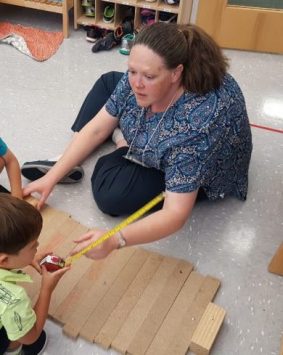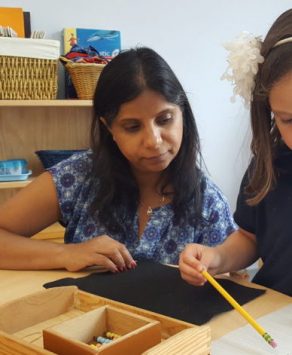
To Squeezie or Not to Squeezie?
As parents of a young child, I’m going to go out on a limb and guess that there isn’t a single one of us out there who hasn’t, at one time or another, thanked that universe for the invention of the squeezie (a.k.a pouches, pouchies, Squooshies, etc.) Whatever your tyke calls them, we have all wondered who invented them and wished it was us!
The proliferation of the food pouch in the last decade or so has occurred at lightning speed. Originally, developed in France for applesauce, the pouch quickly spread to the U.S. where Plum Organics introduced the pouch for baby food. It quickly spread to toddler snacks, yogurt (so much better than the tube!!), and even adult beverages!
However, during a recently faculty meeting here at The Springs, our Infant and Toddler teachers discussed some of the challenges they are facing with children who rely on food pouches. Debate ensued, but a consensus alluded us. We couldn’t deny their popularity and benefits, but the concerns were troubling as well.
We decided to research the topic and were not surprised to find that we are not alone in our mixed skepticism and awe of the almighty food pouch. We all know that pouches are an excellent way to sneak in fruits and vegetables, especially for otherwise picky eaters. Their convenience is unrivaled and kids seem to genuinely like them! Plus, for many infants it allows for independent eating at a younger age, a skill Montessorians traditionally promote.
Yet, our teachers have been noting some concerning roadblocks set up by the pouch. It turns out that many doctors, nutritionists, feeding specialists, and even producers of the food pouch share these concerns. They include the following:
- Delayed eating skills. While there is no doubt, the pouch promotes independent eating, it has come to replace independent eating of appropriately textured foods. Before the pouch, infants discontinued eating pureed foods between 8 and 12 months. Some still argue for foregoing purees all together. Yet, the reliance on pouches is now delaying the introduction of true solid foods until after 12 months and sometimes even later leading to food processing issues in toddlers. The result is toddlers who can’t self-feed appropriate foods with their fingers or a utensil. Some children are now facing months of food therapy to catch up
- Diminished eating experiences. Additionally, pouches short the over-all eating experience as infants cannot see, smell, feel, etc. the food which is an important part of your child’s overall development. For example, when we introduce a toddler to the vegetable nomenclature basket in a Montessori Toddler class, they will have much harder time identifying peas if they don’t know they are green or have never seen them in their whole form. Additionally, they don’t see the process of eating from a bowl with a utensil making it harder to learn down the road since infants learn so much through absorption.
- Inadequate nutrition. The average food pouch contains about 60 calories. It is simply not enough sustenance for a toddler. Experts put them on par with beverages. At school, during lunch, we are seeing children eat a pouch (or two) and then refuse their true solid foods only to be hungry an hour or two later. Pureeing (and packaging) also breaks down nutrients so the fruits and vegetables you might be sneaking in do not pack the same punch as fresh, whole fruits and vegetables
- Injury. At school this has not been a problem as children may not walk around and eat, whether they are enjoying a pouch or table food. However, this is not always the case outside of school. Many children are given a pouch and go on their merry way. However, walking around with anything in their mouth, is a danger. Injuries related to pouches and mobile eating are reportedly on the rise
- Loss of structured meal-time. Due to the eat and go nature of food pouches, experts are seeing a decline in structured, family meals. As a result, children are not learning how to sit for a period of time and engage in a meal. While this is a loss for the fabric of the family, mobile eating also leads to grazing and overeating which are habits that contribute to childhood obesity
- Tooth decay and damage. Similar to the dental issues created by bottles and sippy cups, the pouch is contributing to tooth decay and damage. The pureed nature of the food allows it to sit on the tooth longer and most contain a significant level of sugar. The spout of the pouch also results in prolonged periods of sucking (and sometimes biting) long after a child would normally outgrow extended sucking which can be a factor in the formation of your child’s teeth and palate
So, what to do? Teachers are worried that their students aren’t acquiring the skills they need to be successful down the road, but obviously want their students’ nutritional needs to be fulfilled. The following are some considerations parents and teachers can make to be sure they aren’t using food pouches to the detriment of a child’s development:
- For infants, be sure they are eating the appropriate level of pureed food, i.e. Stage 1, Stage 2, Stage 3
- Whenever possible, squeeze the food out into a bowl and use a spoon so your infant can see and smell the food as well and see the process of using a utensil
- After your child graduates from purees, be sure to use the food pouch as a side or snack, not as the main source of sustenance after 8 months. Keep in mind that they are more on par with drinks than food when it comes to caloric count
- Encourage regular table foods early. Many parents are afraid of choking and hold off, but don’t. You may be harming your child’s long term eating habits. Follow your doctor’s instructions and do not be afraid to introduce table foods, typically around 8-9 months of age
- Pause the pouch. Consider taking the pouch away until solid eating habits and skills are well established. It can be reintroduced later as a convenient on-the-go snack
- Never allow your child to walk around while he or she eats from a pouch
- Consider removing pouches from meal time and focus on table foods. If you must serve a pouch, treat it the same as the rest of the meal, meaning children must sit and participate in the meal
- Consider more structured snack times, especially if your child is uninterested in food at meal time
- Keep in mind that children, especially older infants and toddlers, have sporadic eating patterns. Don’t be alarmed if they skip a meal here and there. Don’t feel that you have to supplement small or uneaten meals with pouches. This only reinforces poor eating habits
- Work together with your child’s teacher to be sure his or her eating skills are developing appropriately. Please understand that if your child’s teacher asks you to stop sending pouches or to send a more appropriately textured food, they have your child’s best interest at heart
For further information, please see the following articles.
- http://thefeedingdoctor.com/pouches-and-squeezies-nice-option-or-enabling-poor-habits/
- http://www.nytimes.com/2012/06/21/garden/food-pouches-let-little-ones-serve-themselves.html
- http://www.npr.org/sections/thesalt/2013/01/30/170667837/oh-baby-squeezable-snacks-might-be-tough-on-the-teeth
- http://www.parents.com/blogs/food-scoop/2015/04/24/nutrition/are-you-making-this-common-toddler-feeding-mistake/
- https://www.healthychildren.org/English/tips-tools/ask-the-pediatrician/Pages/question.aspx?qid=3585

 Ms. Nikki
Ms. Nikki






Comments are closed here.